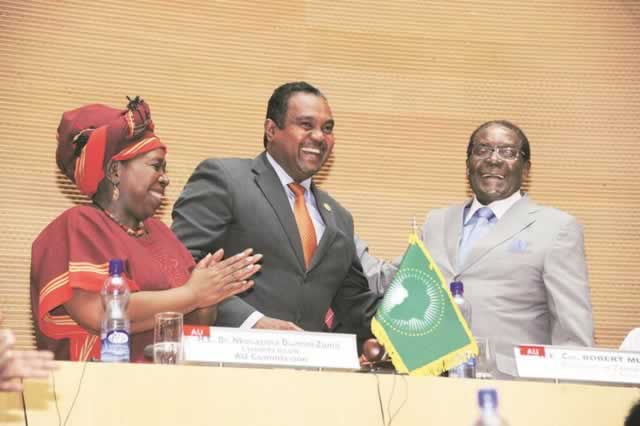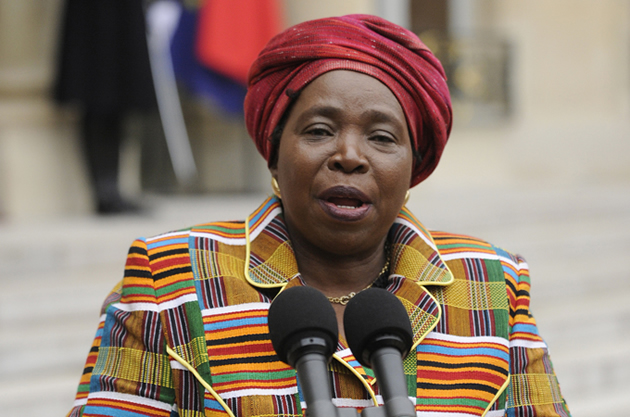President’s crowning moment


African Union chairman President Mugabe with AU Commission chairperson Dr Nkosazana Dlamini-Zuma and president of the AU Staff AssociationSalah Saddiq Hammad at the AU Headquarters in Addis Ababa, Ethiopia
Reason Wafawarova On Thursday
For the oppressed and the poor, President Mugabe is the heroic icon signifying principle, defiance, bravery, endurance and African pride.
The election and elevation of President Mugabe to the chairmanship of the African Union has been hailed as a milestone achievement for the veteran politician by many of his cross-generational admirers and supporters, but not without vilification from the his detractors, mainly political actors from the West, and his home opponents within the demising MDC formations.
Most African leaders of today would have assumed power after 26 May 2001, the day the AU was established from the ashes of first the Organisation of African States, and later the Organisation of African Unity (OAU), and there are a few surviving leaders from that generation of the founding fathers of African independence, and of course there are other surviving leaders from the Cold War era, that period of radical politics and revolutions in former colonies.
To these old generation leaders, and to the generality of the Pan Africanist community, including some many of the younger African leaders, the election of President Mugabe to the chair of the Union is a reincarnation of the revolutionary spirit that brought down colonial empires, of the radicalism that once endeared Africa to the socialist principles of the former USSR, and also the revival of the politics of international equality and justice.
Among the old guard of African leadership still in office today are leaders like Paul Biya of Cameroon; in power for 38 years, Teodoro Obiang Nguema Mbasogo of Equatorial Guinea (35 years), Jose Eduardo dos Santos of Angola (35 years), Mohammed Abdelazziz of Sahrawi Republic (38 years), and Yoweri Museveni of Uganda, who has been there for 29 years.
Elsewhere across the world, there are other such old time leaders like Hun Sen of Cambodia and Iran’s Sayyid Ali Khameni, who have been at the helm of their countries for 30 and 33 years respectively.
The election of President Mugabe to the AU chair has some significance on the global stage, not exactly because the AU itself attracts enough global attention to warrant international recognition of who chairs it, but more because the person elected this time around is a massive political character in global politics. It is hard to ignore the presence of the Zimbabwean veteran revolutionary, whether in admiration or in repugnance.
Zimbabwe has been at the centre of a protracted economic and diplomatic war pitting the Western coalition and the tiny Southern African nation, and for the past 14 years Zimbabwe has had to endure telling isolation from the Western community, with travel bans, trade bans, sport bans, tourist bans, and a blanket blockade to international lines of credit all enforced by the Western powers. The result has been extraordinary economic ruin.
England and Australia banned their cricket teams from playing Zimbabwe on several occasions, and the outgoing Australian ambassador to Zimbabwe counts among his achievements the materialisation of two cricket matches between the two countries, to him a phenomenal achievement worthy of global recognition.
In 2003, the AU had to stand up to the EU when France was hosting the Franco-Africa Summit, and the ban on Mugabe had to be lifted after the African heads of state threatened to boycott the event.
In the same year, a fully-fledged EU-Africa summit had to be called off after the African leaders once again flashed the “No Mugabe No Summit” card right in the faces of the EU leaders.
In a statement the EU said at the time, “In the present circumstances it would not be possible to achieve the broadest participation at the highest-level by both sides. It would therefore be in the best interests of EU-African relations to postpone the summit.”
In 2007 the African leaders, led by the now slaughtered Muammar Gaddafi of Libya, once again declared that the Lisbon EU-Africa Summit would not happen in the absence of President Mugabe, and again the EU gave in, and Britain’s Gordon Brown angrily boycotted the summit, taking his diplomatic sorrows with him to Iraq, where he went visiting invading troops.
The economic strangulation of Zimbabwe was not just a heartless game to punish Mugabe the person on the part of the West, or even to make the people of Zimbabwe suffer for the sake of it. It was rather a political strategy to defeat what President Mugabe stands for: independent nationalism, resource nationalisation, and the economic empowerment of the indigenous African. Mugabe represents a threat to Western hegemony, and his politics are too dangerous to be ignored.
The economic sanctions were not only a political strategy, but an acutely expensive one as well, pouring billions of dollars into an anti-Mugabe civic society, as well as into the coffers of an abrasive MDC opposition, full of opposition fury, but absolutely hopeless in terms of political strategy and public policy. It turns out the money was an absolute waste.
At a time the West is counting the losses, and the United States is coming after the squandering NGOs with auditing vengeance, President Mugabe rises to chair both SADC and the AU. In Mugabe’s hour of glory, the MDC watches as a moneyless outfit, struggling to live without the helping hand of Western funders, and the party has splintered into several off shoots, each full of hate against the other, and almost all sharing common hate for Tsvangirai in particular.
All prospects for change in governance leadership are now perceived only within the politics of ZANU-PF, and even the opposition publicly concurs.
President Mugabe’s number one political challenger in Zimbabwe now stands as a disgraced divisive figure in opposition circles, deserted by the West and by his own comrades, and it must be delightful for President Mugabe and his supporters that the veteran politician’s star seems to be rising, making him a unifying figure for Pan Africanism, giving what his global admirers will surely call a crowning moment.
For the oppressed and the poor, Robert Mugabe is the heroic icon signifying principle, defiance, bravery, endurance and African pride. He has travelled to Accra, Nairobi, Pretoria, Lusaka and many other African capitals where standing ovations have become synonymous with his presence. The Harlem community in the US literally worships him, and so do many of the common people across the world.
Mugabe’s political life started as a young Marxist revolutionary fighting for the liberation of the colonised people of the then Rhodesia. He won the advent one man one vote election in 1980 as a popular militant revolutionary. He then surprised even his own enemies when he announced the post war reconciliation policy, declaring that bygones would be bygones, and accommodating the former colonisers as equal citizens in the new Zimbabwe. In fact he mentored South Africa into this hailed policy.
His reconciliatory principles endeared him to the West, attracted a lot of diplomatic corporation, and a promising nation-building programme started as a result. There was a massive expansion of the education sector, leading Zimbabwe to top the continent’s literacy rates. The health sector expanded and developed as well, and so did infrastructure and other social projects. Cities expanded, with many post-independence residential suburbs sprouting across the country’s cities.
The Zimbabwean leader played statesman roles in ending the civil conflicts in Mozambique and Angola, with those efforts largely contributing to his knighthood award by the Queen of England in 1994, later to be angrily revoked in 2008.
Tony Blair and his New Labour outfit underestimated the cost of their miscalculation on November 5, 1997 when Claire Short wrote a letter telling the Zimbabwean government that Britain had no obligation to honour pre-independence agreements by the Thatcher government, especially on the issue of funding the land redistribution programme. That letter changed the political landscape in Zimbabwe drastically, leading to some minor land invasions by disgruntled masses that year, then to the 2000 radical mass reclamation of white occupied farmlands, to which the West reacted with tempestuous indignation.
The IMF-led ESAP programme of 1992 had been a monumental disaster on Zimbabwe’s economic front, laying off hundreds of thousands of workers in the process, and making living conditions for the generality of the population plummet to unbearable standards.
As a result a labour-based opposition was on the rise by 1996, leading to the 1997 food riots. Student politics in tertiary institutions started to shift from Pan Africanism to anti-establishment.
The West saw an opportunity in the rising opposition, and no sooner was the formation of the MDC in 1999 than we started to see the flow of Western moneybags into opposition circles.
The ousted white commercial farmers openly declared their funding support for Morgan Tsvangirai and his party, and that squarely placed the MDC on the enemy side of the Britain/Zimbabwe diplomatic war, arming ZANU-PF with devastating propaganda machinery.
It became smoothly easy to discredit the MDC as a shameless outfit of mercenary puppets; stand for nothing quislings with no principles at all. The MDC did very little to correct this growing perception, and the damage to the party’s brand was catastrophic, especially on the African continent.
While there are Zimbabweans who are convinced that the cost of President Mugabe’s principles is unbearable, agreeing with all of his policies in principle, but criticising his means, the majority of Africans will easily celebrate the Mugabe legacy as a statement of African sovereignty.
Clearly the West has softened its offensive on Zimbabwe, and the fact that the EU has almost instantly lifted the travel ban on President Mugabe to allow him to carry out his duties as the AU chairs tells it all. In the past this gesture would not even be imaginable.
There have been significant changes to Western leadership since Tony Blair internationalised the diplomatic conflict between his country and Zimbabwe, and many of the new Western leaders have not seen any value in the economic sanctions against Zimbabwe, and this has significantly contributed to the easing of Western pressure against Zimbabwe.
The other contributing factor has been the collapse of the clueless MDC, rendering the Western-engineered regime change project effectively futile. For many in the West it is now more sensible to deal with ZANU-PF than trying to get rid of it.
There is evident fatigue in Western political circles on matters relating to Zimbabwe, including in the media and the so-called donor community, and Zimbabwe is no longer the exciting political topic of the post 2000 decade.
Of course the West is also seized with more pressing meddling matters in the Middle East and in East Europe, apart from the frightful scare of terrorism in Western heartlands, and that has meant reduced focus on Zimbabwe.
A true crowning moment for President Mugabe can only come with the realisation of the fruits of his domestic policies for Zimbabwe, and if those that count themselves his comrades are not hopeless pretenders, they need to make sure that the economically productive Zimbabwe of the nineties and the eighties is revived to cap the 2015 political achievements of the Zimbabwean leader.
Zim-Asset has to deliver tangible results for the people of Zimbabwe, the land distributed among our people must by now be feeding our nation, the indigenisation policy must not continue to be “clarified” over and over again, but must be well defined to start stimulating industrial production, without which the policy serves absolutely no purpose.
Only a prosperous Zimbabwe can give President Mugabe the legacy he doubtlessly deserves. Election victories in themselves will not do the trick.
Zimbabwe we are one and together we will overcome. It is homeland or death!
REASON WAFAWAROVA is a political writer based in SYDNEY, Australia.










Comments